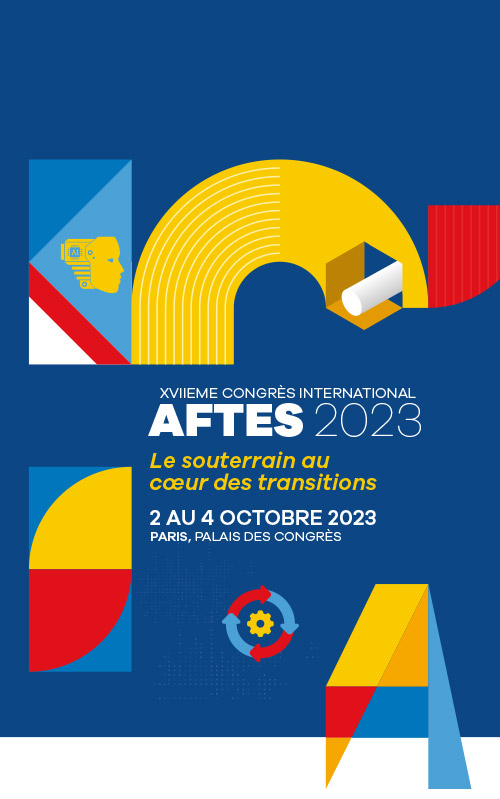Call for abstracts
Calendar of the call for abstracts
- Opening: April 4, 2022
- Closing: Septembre 15, 2022
- Final selection by the Scientific Commission and notification to authors: early November 2022
- Writing and submission of articles by the selected authors: until January 31, 2023
- Choice of orals by the Scientific Commission and information to authors: March 15, 2023
- Change in registration fees: May 31, 2023
« Underground space at the heart of transitions»
AFTES wishes its 2023 Congress to highlight the underground space industry's significant role in the wave of transitions currently rippling through society:
- Low-carbon transition
- resilience in the face of climate change
- digital transition
- new technologies for deploying innovative and adapted solutions
This conference aims to provide an opportunity for all underground developers and underground stakeholders (decision-makers, management contractors, developers, urban planners, infrastructure managers, designers, builders, suppliers, etc.) to share their experiences and projects and to contribute on the following aspects.
These contributions will be organised around the following topics:
A. The development of underground space to meet new needs and facilitate transitions
- Considering underground space when addressing low-carbon mobility other and new uses, whether for new-build projects or for adaptations to existing infrastructure
- Innovative urban and interurban logistics projects
- Harnessing sub-surface resources and energy gains achieved by using the sub-surface
- The role of underground infrastructure in regional resilience and adaptation to climate change
B. Changes in performance requirements, project management and the design of underground spaces and structures
- Effective use of life cycle analysis when defining project performance requirements
- Identifying transitions in development strategies
- Changes in contracting processes intended to incorporate performance requirements and changes to standards
- Ecodesign and anti-waste measures
- Promoting rational design, reuse and recycling
- Standardisation designed as a source of long-term savings
- Digital transformation of design professions; CIM/BIM
C. Feedback, technological innovations, achieving the objective of carbon neutrality in underground construction
- Technological innovations and feedback
- The role of low-carbon materials
- Lean construction and decarbonised construction sites
- Managing excavated materials
- Digital technology and IoT in the construction industry
- Big Data
- Health, safety and ergonomics
- Robotisation and the role of artificial intelligence
D. Strategies for establishing underground structures
- Climate change resilience-oriented facility operation
- Development of digital twins and their uses
- Harnessing artificial intelligence for operations support
- Ongoing use of collected data: from design to operation
- Resilience of facilities with regard to safety and security of their uses
- Structural refurbishment and management of underground assets
Our Congress aims to offer a forum for all underground space stakeholders, and as such, we are willing to consider all proposed contributions, even if not directly related to the selected themes.
Scientific commission
- Michel Pré (President) France
- Emmanuel Humbert (Vice-president) France
- Jean Piraud France
- Jean-Bernard Kazmierczak France
- Hubert Tournery France
- Eric Leca France
- Elena Chiriotti France
- François Laigle France
- Monique Labbe France
- Roland Leucker Germany
- Robert Galler Austria
- Jean-François Thimus Belgium
- Tarcisio Celestino Brazil
- Verya Nasri United States
- Lorenzo Brino Italy
- Anna Siemińska-Lewandowska Poland
- Christophe Carron Switzerland
- Gérard Seingre Switzerland
- Denis Branque France
- Reza Taherzadeh France
- Didier Subrin France



